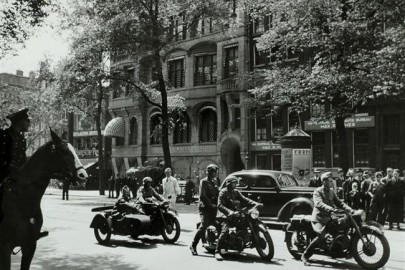You may have thought The Damned United had said everything worth saying about Leeds, but a new book looks at the relationship between England’s most controversial club and its city’s Jewish community…
United’s peaks and troughs over the past fifty years have coincided with the peaks and troughs, not only of the game itself, but also of the city of Leeds and its Jewish community. The Leeds United story is intertwined, in my mind at least, with these other two stories. All three came of age together. All three thought the world was theirs for the taking and the shaping. And all three, in recent times, have turned inwards.
Anthony Clavane’s been writing about Leeds United for the whole of his life – his first piece, about his hopes for the 1975 European Cup Final, was published by a local newspaper when he was 14. They were his team then and his team they’ve stayed, his allegiance even surviving a spell during which, he says, he attempted to recreate himself as a “rootless cosmopolitan.”
Promised Land: The Reinvention of Leeds United is Clavane’s contribution to the fan-author meme kicked off by Nick Hornby. Hitherto, football clubs in this genre were the solid, fatherly background to a fan’s pratfalls and misadventures. But we’re talking about Leeds United now, and it’s the club here, not Clavane, that has the binges, the rehab, the one-night-stands and the near-misses.
There have been a lot of Leeds books in the last few years. Acknowledging his debt to them throughout, Clavane has little to add to what we know about events on and off the pitch. He’s readier than most to discuss the racism and violence that hung around Elland Road, and is a restrained worshipper at the shrine of St. Don. But there’s a flatness to the football. For all Clavane’s protestations of loyalty to the club, the book’s heart is elsewhere.
Most histories of football clubs throw in some snippets to remind the reader of the world outside the touchline. Usually these reflect the writer’s own enthusiasms – pop bands, that kind of thing – and there’ll be some pre-packaged laments about the “decline” of “working class culture” to cover over the writer’s failure to come home from London or the Home Counties. Clavane himself ended up in Brighton. But he’s entirely serious about telling the story of the Jewish community in Leeds, serious about telling the story of the city itself and serious about intertwining it all with the fate of the club: these are the areas which set the book apart and bring it to life.
This is all very different from the recent clutch of top quality football writing, and so is Clavane’s choice of guiding star: Keith Waterhouse, author of Billy Liar:
I’ve always associated Waterhouse’s classic tale of an upwardly mobile, inwardly anxious Northern Man with the story of Leeds… its narrative hinge… is whether our anti-hero would dare to act on his fantasies and actually cross the threshold” into the promised land. “Waterhouse, (Alan) Bennett, (Tony) Harrison and (David) Storey are my literary heroes…They were cultural pathfinders, the Leeds-based wing of the New Wave movement..Their breakthrough into the big time coincided with both the rise of the Revieites and the city of Leeds.
These three arcs – football, culture, and the city itself – parallel the story of the city’s Jewish community, into which Clavane’s great-grandfather, clearly a man of immense courage and fortitude, stepped in the early years of the century, a refugee from Tsarist pogroms. The Jewish community, the city, the club and northern writers alike faced similar challenges. The fight for survival, then acceptance: the search for breakthrough, the efforts to maintain success. The Jewish community faced a Christian establishment, the writers an Oxbridge/London one: the city went up against Manchester and Birmingham and the club.. the club took on the world. But ultimately, each were after the same thing: “a paradigm shift: a one-way ticket out of a life of provincial isolation.”
Clavane has stirring stories to tell, and tells them brilliantly. By the end of the 1960s, a sign hung over the railway station reading “Leeds, The Promised Land Delivered.” But Leeds lost the 1975 European Cup Final; recession and globalization destroyed the city’s industry; Waterhouse, Bennett and Storey became period pieces; the Jewish community moved out into the Yorkshire Dales.
“At the crucial moments in their history, just as they were about to close in on the pinnacle,” Clavane writes about Leeds United, “they have, quite simply, blown it.” It’s an analysis that extends, with little alteration, to the fortunes of Northern Man, of the city, indeed of the whole “dream of a genuinely fluid, open society, with opportunities for all.” But with Leeds United on the up, and dismay at laissez-faire’s results spreading across all three parties, the note of cautious optimism with which Clavane closes could prove prescient for more than just football. This fine book should survive long enough to find out.











I’ve just been finding out a bit about some of my ancestors lately and turns out they ran an extremely progressive newspaper in Leeds that was read by the Jewish community there, seems like it was an enlightened place
I knew about the Spurs having strong Jewish links but not Leeds United. I wonder if there are any others. There seem to be plenty of clubs with confessional links in football – mostly in Scotland and northwest England – but I can’t think of one in any other British sport.